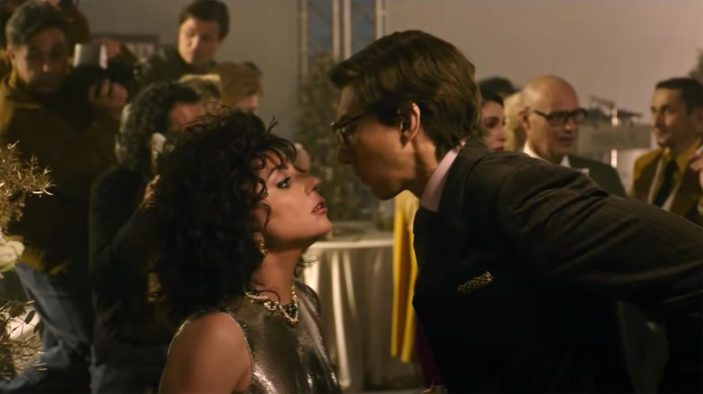
House of Gucci is the second 2021 film from acclaimed filmmaker Ridley Scott. The first was the medieval drama The Last Duel, which was about a true story involving a woman who was fighting for her voice to be heard after being sexually abused in a tyrannically and patriarchal society. The second is about a true story is about a woman who had plotted a murder toward her spouse after being driven by greed motivated by patriarchal business as well as her own desires. Scott has never been a stranger to telling the stories of women; particularly with films like Thelma and Louise and G.I Jane.
On his storytelling approach to House of Gucci, he has foregone the serious and dramatic route of The Last Duel as well as a strict biographical approach. Instead, he has chosen a soapy, farcical route – laced with moments of integrity for good measure. Scott has built his film like a $100 million dollar episode of Dynasty. He approaches his characters as overstated caricatures that are driven by greed as if they have dollar signs on their eyes and he mines the humour out of them for all they are worth.
Scott wisely knows that overwhelming pantomime from the story or the cast will wear out the audience so he introduces the order of male actors from the least amount of scenery-chewing to galaxy ham levels; making the escalation feel immersive and welcoming. As the film reaches the second act, we are introduced from Adam Driver to Jeremy Irons to Al Pacino and Jared Leto; roles of escalating pantomime levels that ridicule all the moral depravity for all of its worth.
He tells the story from the first act like a fairy tale, where Patrizia would meet her handsome prince and they would live happily ever after. Then the extended ending to that fairy tale happens. The drama of the story still hits well and not just due to its factual origins. Scott lends the film enough integrity, along with the actors’ work from Lady Gaga and Driver, to make their predicaments have an impact.
The work by screenwriters Becky Johnson and Roberto Bentivegna does not even bother with historical facts as they prefer to focus on the scenarios they could concoct from the premise of the true story and what one thinks when the name Gucci is mentioned. Their screenplay features hilariously contrived nuggets that no human being would ever say; including a monologue about duplicity inviting comparisons to the taste of both chocolate and faeces.
The choices in the soundtrack – including Faith by George Michael during a wedding sequence – are amusingly blatant that it feels like Scott was having a laugh over the predicaments the characters would face. Even a sex scene between Gaga and Driver is refreshingly blunt, with no romanticised veneer over it whatsoever as they inhabit their own world together.
Speaking of worlds colliding, most of the ensemble cast are acting in their own world — Driver instils his role with quiet dignity while Irons, Pacino, Hayek and especially Leto devour the sets with their scenery-chewing. However, it does make thematic sense as the wealthy people the actors are portraying in the film always think the world revolves around them; making their orbits feel suitable in tone.
But what brings them altogether alongside Scott’s direction is Gaga’s stellar lead performance. She is the solid bridge that brings the disparate tones of sincerity and camp together that makes the film work on her shoulders. Much like her work in A Star is Born, Gaga is able to make her superstar persona disappear and inhabit the role of Patrizia with effortless ease. Her accent is emblematic of that bridge, as her intonations vary from genuine Italian to an impersonation of Natasha Fatale from The Rocky and Bullwinkle Show. However, her chemistry with Driver is believable, her character arc is convincing and her work is overstated but weighty and forceful — you simply cannot look away from her.
The latter statement can be said for Leto’s work but for hilariously opposite reasons. His work involving dollops of makeup, a sing-songy [sic] “Italian” accent, gesticular [sic] movements widen the two tones so far off, he almost threatens to derail the picture. Thankfully, he provides more than enough humour – a scene involving a scarf and belittlement will make you laugh in utter shock — that his work adds fun to the proceedings; especially when he is on-screen with Pacino, who has some of that hoo-ah [sic] energy still in him.
House of Gucci will no doubt disappoint history purists and those who are expecting a purely accurate portrayal of said true events. But Scott’s disdain for the people in the story that he is portraying has provided his most purely enjoyable work since 2015’s The Martian.
FOUR STARS (OUT OF FIVE)
House of Gucci is showing in cinemas now.
